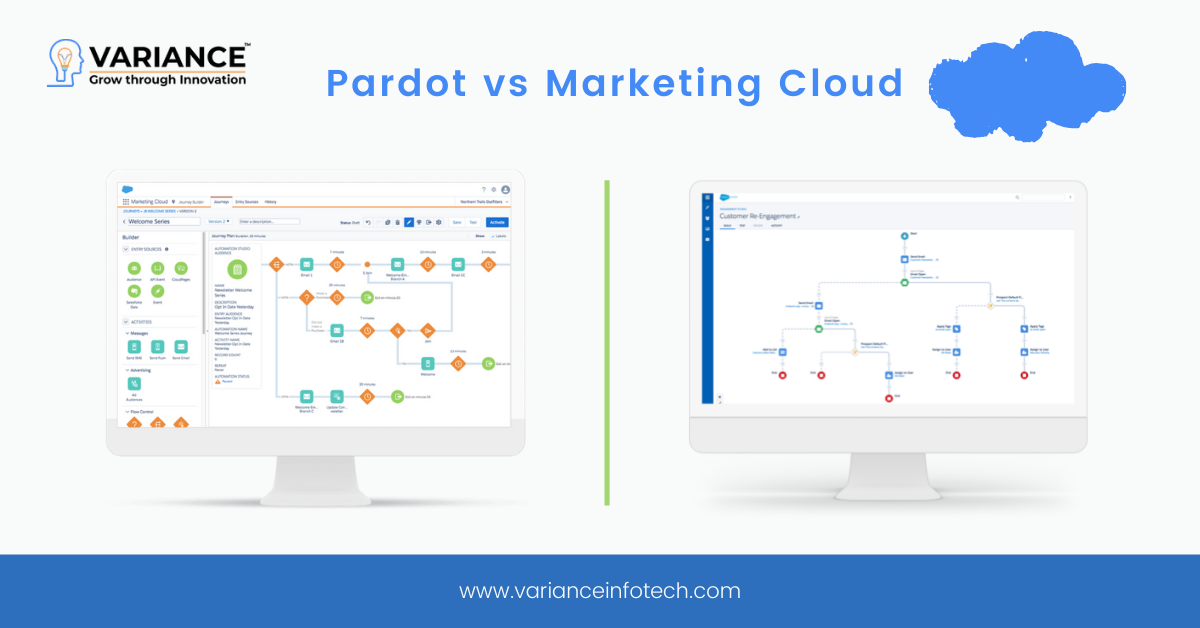
When Salesforce acquired Pardot in 2013, many digital marketers assumed that Pardot would be integrated into Salesforce Marketing Cloud, adding to their extensive marketing services and functionality. However, this was not the case, and to this day Pardot is a separate offering while still falling under the Salesforce banner.
Pardot and Marketing Cloud also distinct from each other, as per their features. It is important to know where they both differentiate. This will help you to decide which one will be proper for your company.
Pardot- Pardot is a SaaS marketing automation platform driven by Salesforce. It is a lead management tool designed for B2B sales and to manage campaigns of marketing organizations. The main purpose of this tool is to use for an e-mail marketing tool.
Marketing Cloud- It is a platform for delivering relevant data based on journeys across channels and devices. It enables marketers to deliver the right message at the right time to the right people throughout all phases of the relationship. It includes integrated solutions for client management, mobile, email, social, advertising, web personalization, content development and management, and data analysis.

so what’s the difference?
In a nutshell, these are the main differences:
- Pardot is positioned as a B2B platform while Salesforce Marketing Cloud is more B2C (although this isn’t always the case and some companies can use both)
- The main difference is the buying cycle. Smaller databases with higher value sales would be better targeted via Pardot and larger databases with smaller value sales would do better with Marketing Cloud.
- Pardot is primarily an email marketing platform whereas Marketing Cloud has other functions like Advertising Studio and Mobile Studio.
- Pardot enables greater marketing and sales alignment for B2B teams.
- Salesforce Marketing Cloud is great for 1:1 customer journey communications with mixed communication channels.
However, there is no rule that says B2C companies cannot benefit from Pardot as their chosen marketing automation platform, and likewise, B2B companies with Marketing Cloud.
Depending on your business, the digital channels you utilize for marketing, the size of your database, and what you need to achieve with your automation software, either could be appropriate.
With these differences in mind, Marketing Cloud makes for the best choice if your business needs a platform to more easily engage with customers across multiple channels and assist in their customer journey. Those in the retail or FMCG industries are likely to see great benefits in the features of the Marketing Cloud.
On the other hand, Pardot is the right option if your sales process requires long-term nurture and you need to bridge the gap between your sales and marketing teams. Those with products of high-sales value or with long sales cycles will benefit most from Pardot.
In Summary…
Pardot Pros & Cons
| Modest price | Limited analytics compared to Cloud |
| Easier to get up and running | Lacks social, mobile and other marketing-specific tools |
| B2B focus | Limited external integration |
Salesforce Marketing Cloud Pros & Cons
| A full package of marketing tools from mobile to web | Expensive |
| B2C focus | More complex than Pardot |
| Full analytics and integrated campaigns |
Do You Need more information?
For any further information / query regarding Technology, please email us at info@varianceinfotech.net
OR call us on +1 630 534 0223 / +91-7016851729, Alternately you can request for information by filling up Contact Us

 Please wait...
Please wait...
Leave a Reply